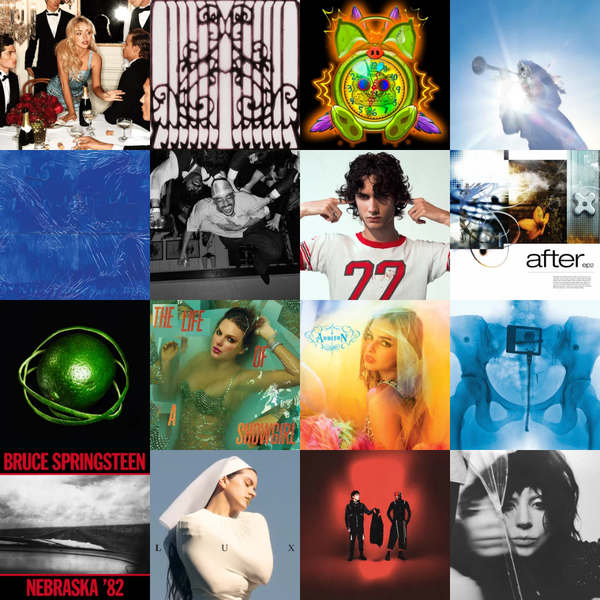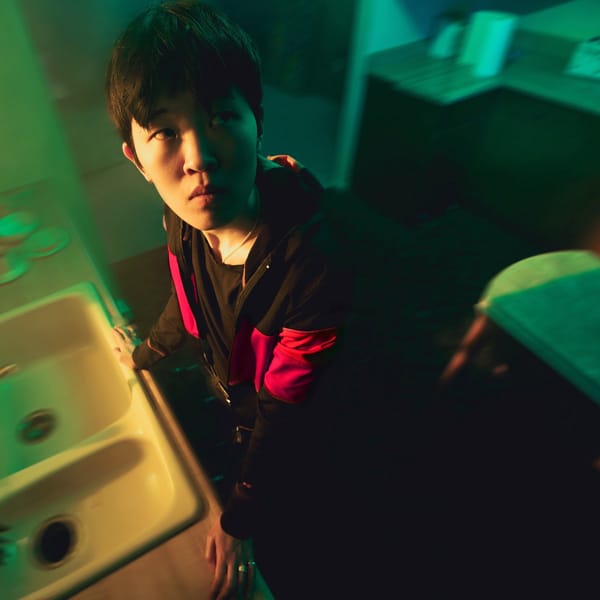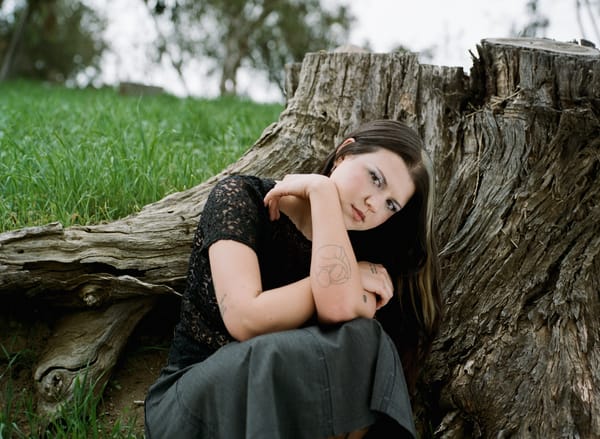Doing The Hustle: Boys Go To Jupiter Director Julian Glander on Florida, Karl Marx, and Animating His Beguiling New Movie In Blender
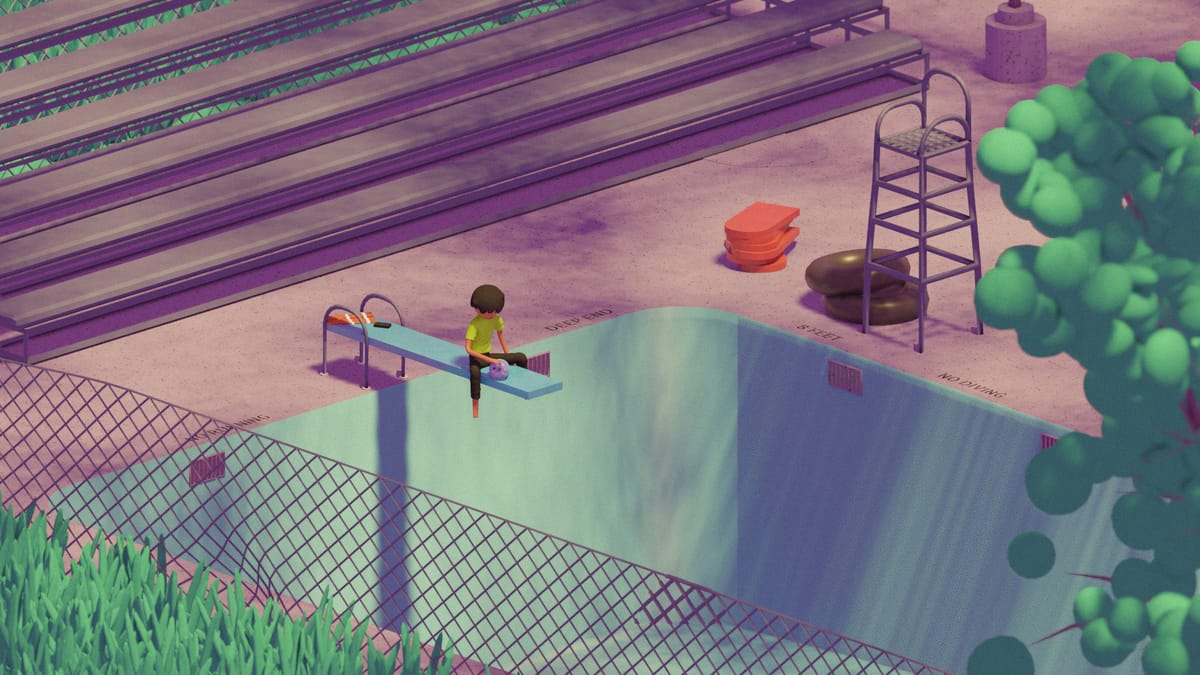
Boys Go to Jupiter, out in theaters in NY via Cartuna and coming soon to a bunch of other places, is an exceptionally silly new film from Julian Glander. His illustrations have blessed newspapers, Dua Lipa’s music videos, and more. He previously released a sweet short about the life of a tennis ball voiced by Clairo, which should give you an inkling of what to expect. His distinctive blobby style has also appeared on HBO Max's Summer Camp Island, as well as books like comic collection 3D Sweeties and I Want To Be A Vase, a children's book from fellow purveyor of deadpan whimsy Julio Torres. This is Glander's first feature film, which premiered at the 2024 Tribeca Film Festival.
The film follows Billy 5000 (Jack Corbett), a Grubster delivery boy trying to make $5,000 while encountering various characters, both human and otherwise. He finds himself increasingly alienated from his old friends, leaving behind their beatboxing, rapping shenanigans in an attempt to be more “mature.” Along the way, Billy unexpectedly meets an alien named Donut and falls in love with Rozebud (Miya Folick), who works at her half-dolphin mother’s experimental orange grove. The cast is particularly star-studded for a certain kind of online person: aside from Torres, the great comedian Demi Adejuyigbe plays hustle-culture podcast host Mr. Moolah, Eighth Grade star Elsie Fisher plays the little boy Beatbox, and most importantly, Rookie founder Tavi Gevinson plays a worm named Glarba.
Jupiter is not far off from an animated version of Torres’ Problemista, down to the visual tangents and surprisingly trenchant social commentary underneath the nonchalance. Watching is like spending 80 minutes or so lulled into a pleasant hypnagogic state with moments of sharp lucidity. Like the recent Oscar-winner Flow, it was animated entirely in open-source CGI software Blender, and Glander tells me the look of the film is the result of "this extremely powerful software on my very not-powerful computer."
I also likened it to the cult 00s web series Homestar Runner and the late-90s slice-of-life high school cartoon Daria, the laid-back deliberate innocence of the former meeting the cynicism of the latter. (Two more came to mind writing this intro: the dry wit of Peanuts and the magical-realist proto-gig economy narrative of Kiki's Delivery Service. If all of the above took place in a late capitalist hellscape seemingly made of Jell-O, that would sum the movie up perfectly.)
Here is my interview with director, screenwriter, producer, and composer Julian Glander!
Can you talk about the visual style for this movie?
I've been doing 3D illustration animation for 12 years now, and I've been using [open-source animation software] Blender the whole time. I think the visual language of these super simple characters and these bright acid pastel colors all come from the constraints of using this extremely powerful software on my very not-powerful computer.
I grew up in suburban Florida where this movie takes place, and specifically I grew up outside of Orlando Lakes where Edward Scissorhands was made. That version of Florida, that pastel suburbia, is so deep within me, and those colors are so deep within my life that they come out, they are vomited out any chance I get. I saw Florida as this magical place that is darkly magical, the place where 50 years ago they built Walt Disney World and they conquered the swamps and all these fantastical tour tourist attractions came up, and now half a century later, everything's sort of covered in moss and decayed and it's almost like a wasteland.
It’s kind of a love letter to Florida at a time where Florida is kinda taken over by, well…
I think this is what's so interesting about it for me, I haven't been there in a long time, so I left when I was 17. My parents don't live there anymore. So this is my dreamy memory of Florida. But I also think this is a little extremity of America that's the most American place there is. And because there's not a long shared history of the people there or a shared identity necessarily.
You have these competing ideologies. You have the Bible Belt’s Florida, you have the retirees’ Florida, you have Miami, you have Ron DeSantis’ Florida, you have Mickey Mouse's Florida, and it seems like they're always sort of at war with each other to define what this place is. Billy 5000 is this delivery driver who sees himself as sort of a neutral ghostly observer of the world. And he is meeting the whole gamut of these freaks who live down there. And of course, every freak in Florida thinks they're normal, which is like, I don't know. It's funny.
There’s the infamous Florida Man trope.
Florida Man is real, but you look and Florida Man is in every part of America. Americans look at Florida the way that other countries look at America, like oh, that's the hellhole of America, but actually, it's where America happens. It's where our cultural conflicts get worked out, where our new ideologies are born, they sort of fester down there. So it's juicy. You see it portrayed a lot in the media in a lot of different ways. I feel like we have seen, certainly with the A24 movies of the last decade and that Florida book, the idea that Florida is hell. That's my memory of it too, being 16 years old wearing black girls' jeans and a black t-shirt, and with my straightened hair just melting, just being punished all day by the oppressive heat. That's all I can think about when I think about Florida.
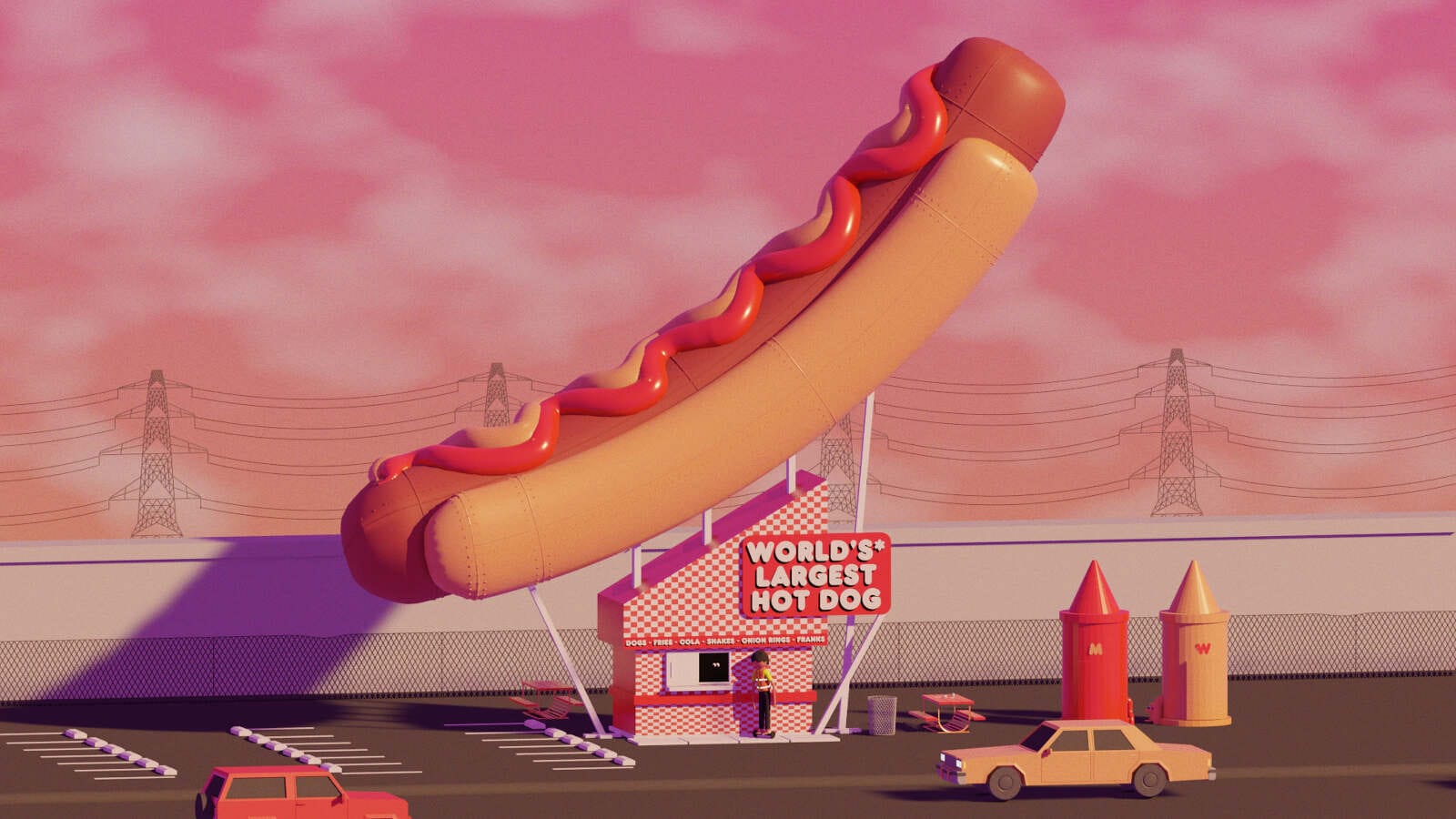
Would you say the hustler-culture theme of the movie is at all inspired by freelance illustrator work?
Yes, unfortunately it's all too real for me! In the opening scene of the movie, Billy is pulled away from a relaxing day at the beach with his friends by an alert from his food delivery app Grubster, and in the process he ends up missing out on a kind of magical once-in-a-lifetime experience. He has a lot of lies he tells himself, along the lines of "I get to be my own boss and set my own hours." I used to tell myself the same lies, and this is one of the more twisted parts of being a freelancer - even if you're not working very much, the idea of work is hanging over every moment of your life. You have to check your email like your life depends on it.
Is there anything you watched or that you looked at as a touchstone while you were making it?
I was watching a lot of live-action and writing this as if it was live action, and stealing a lot of shots from live-action films. During the writing process, one part of my day was after dinner, I would watch a movie and I would make a note to steal one thing from each movie that I watched, whether it was an editing trick or a character moment or a shot. The most visually informative movie to this movie is The Wizard of Oz. I just love it! I might cry talking about it, but it is the perfect movie. They got it right almost a hundred years ago, and we've all sort of been scrambling to keep up. And I think it's a different kind of fantastical American story, but the specific elements I took from the Wizard of Oz were their use of gates. A lot of what Billy wants is almost always on the side of another gate or door. And the people who operate those gates and doors are often obscured and trollish. Then also as in the case of Oz they're often revealed to be powerless, little dorks in the end.
I love that when someone is speaking out of a car or behind a door, the face appears on the object. It reminded me a bit of Labyrinth's talking doors.
Labyrinth is a big influence, just the logic of that world. The fact that we are able to move through and accept things as they come up, which I think is a really fun way to watch a movie because even the most mundane movie is still a weird dream. The most naturalistic movie still doesn't make any sense. So I think it's okay for it to really not make sense.
I know that you don't really have mockups of storyboards. Can you talk a little bit about the process of animating a scene?
My hot take is that I am not a storyboard guy. They're sort of the structure that holds the entire animation industry together. They are often the sacred texts that a movie comes from, and I think that's what I don't like about them. I have found working on boarded projects in the past is once you have 90 minutes of storyboards, you're just following instructions for the rest of the process. It's putting together IKEA furniture or something as opposed to building the movie as you go. So for me, the script was a little more sacred and we were more open with what the actual movie ended up looking like. I animated the first pass of the movie as a series of 75 wide shots.I had the radio play of the movie, then it was like for each scene, what’s the one shot, the wide shot that tells the story of the scene and can we get away with just doing the scene in that shot? The first cut was just 90 minutes of wide shots, then I just watched
It was sort of like I had the voices, I had the radio play of the movie, and then we asked ourselves, what's the wide shot that tells the story of the scene and can we get away with just doing the scene in that shot? And so the first cut of the movie was 90 minutes of wide shots, and I sat with my producer and we would just sort of make a little timestamp wherever our bodies felt like the camera wanted to move. So the creative sell of this is we have some distance from the characters because they're living in this gamified world where they've sort of been isolated from each other and dehumanized by the relationship to work. So that's the creative conceit that validates all my shortcuts that I wanted to take.
There’s one scene late in the movie where a character crashes out and the camera abruptly zooms back and forth. Can you talk about that?
I don't know if you've ever played the game Lego Island, but it’s from the 90s – probably before your time – and it’s this 2.5D game. It’s beautiful and informative to the movie because you play as a pizza delivery boy, but if you lose the game and let the villain get away, they show you what really happens. It’s the tragic ending where Lego Island is destroyed. I remember the first time it happened, I cried. I was like, I can't believe this. I ruined Lego Island. But I really like the brutality of that. But the camera work is inspired by that as well.
Rozebud, Billy's love interest, gives Billy a book called “Economics Without Economy.” Can you talk about casually incorporating leftist theory into your 80 minute Blender movie?
So the character of Rosebud is the main character's sort of object of fascination. He has a crush on her. He also wants to be her. He wants her life, and they're sort of constantly tussling with each other in terms of who's on top, who's calling the shots. But she's a complete bogus leftist, just somebody who has no stake in the game, somebody who recites theory to win arguments. It’s a person that I know very well, and a person that I am sometimes. The way I pitched it to Jack [Corbett] was he came into the studio, and I didn't have anything written for that passage. I just had in brackets “dense economic theory here while they ride a scooter”. And Jack informed so much of the movie with his point of view on economics and the way they meshed with everything else in the world. And he's really intelligent, obviously. So I asked him, “do you have something that's from the early industrial age that’s really convoluted, maybe a really stupid metaphor that we can sort of jump off of?” He recalled this thing from called The Fish in the Mud, and it's classic Gilded Age writing where it's like, “man is a fish and he's trapped in mud, but he will crawl out of the mud because it's in his economic interest.” So from there, we riffed off that and wrote this analogy with the snail and the ants. I think it's really funny because it's the kind of text that I used to fall in love with where it's juicy and it feels like it's saying something, and then when you pull out a little bit, it's actually not. But Billy, he certainly has a leftist journey.
Mr. Moolah reminded me a bit of how young men are indoctrinated into the Mansophere.
He’s steeped in hustle culture. I think the people who really believe in that and really study it are almost one step away from actually completely unlocking what this all is. Because I sometimes look back at Karl Marx, when I read a lot of Das Kapital, I actually see him as laying out hustle culture and describing a way to operate in it just as much as he's criticizing it when he talks about money., it's like Andrew Tate could also be talking about M-C-M and pitching it as a good thing.
Let’s talk about the voice cast. Tavi Gevinson and Reductress writer Eva Victor are not known to be goofballs, and they’re in this goofy movie. Gevinson’s character is named Glarba and she speaks an alien language for most of the movie.
Well, Eva’s become the king of the year with their movie Sorry, Baby.
From what I've heard, that's a heavy dramedy about processing trauma, and yet they’re also in this, which is the opposite.
I had no idea they had that coming. We recorded two years ago before they had that up their sleeve. I’d worked with them on a TV show called Summer Camp Island, and when I was in New York putting together the movie, I was at Mike's Coffee in Fort Greene, and I went to them and said "I don't know if you even know who I am, but we worked together a couple years ago and I’m working on this new thing.” There was this kinda cool older sibling character I didn’t know what to do with, and trusted Eva to figure it out. They did!
How did you get Tavi?
I knew Tavi on Instagram for a couple of years and I said “this is a long shot, but do you want to play a worm?” But I think because this was a cast of people that I really respected and admired, it pushed me to write the characters with a little more depth. Because the first draft of that warm character is very much a “take me to your leader” alien. Without giving away the whole movie, I asked myself “What if this alien that’s creeping around is more than just that? What if there’s something contemporary about her?” And it becomes one of the most important threads in the movie.
Can you talk a bit about putting together the music?
My executive producer and I were in a band together a long time ago, and that's was really how we started working together. So this is my revenge for being a failed musician, tricking people to listen to eight songs I wrote. Miya Folick’s song is really beautiful, and Grace's [intentionally off-key] “Egg Song” is actually also really beautiful… somehow. For Jack, I had never heard him sing. I saw a picture of him on Instagram stories holding a bass guitar. I think his songs are just perfect because he's totally singing within character, and there's this sort of warbly confused uneasiness to his voice that feels very teenage to me. And I love musicals, and I specifically love musicals that have a musical point of view. I love Grease because it sounds like the fifties, and I love Nightmare Before Christmas because it’s so gothic. I was thinking, “can we do a musical that's not the Broadway musical sound?” So the Sonic palette here, I think, is what these characters would be listening to, or what kind of music a 16-year-old would make living in his garage on a MacBook.
My favorite joke of the movie is when Freckles, who’s been rapping up to his point in the movie, suddenly switches to sad acoustic ballads because “I’ve done all there is to do with rap.”
At the time, I saw a lot of teenage white rappers on TikTok had this extremely confident attitude and truly sucked, and I couldn't stop watching them. So for Grace's song, I wanted this realy naive, unskilled guitar playing and singing. And I sent her “True Love Will Find You In The End” by Daniel Johnston. She came back when she was in the studio, she said, “I don't think Freckles would listen to Daniel Johnston, I think he would listen to Machine Gun Kelly.” And that’s the modern touchstone of the rapper turning to sensitive rock. We kept ramping it up in the studio for each take we did until she was just screaming her heart out for the egg song.
Can you talk about developing Miya Folick's song "Winter Citrus"?
The song predates the movie and is the centerpiece that Boys Go to Jupiter is built around. I have some demos with these chords from as far back as 2018. The chords are borrowed from "When You Sleep" by My Bloody Valentine. The chorus: "Tastes like heaven/tastes like honey/tastes like piles and piles of money" is referring to a genetically modified citrus fruit, and more broadly it's about the ways commerce and industry infect every area of life, corrupting things while making them shimmery and beautiful on the surface.
The character of Rozebud was the hardest to cast because we needed someone who could sing the song and do the dialogue just right. Miya was perfect and also a total pro. I don't know if we used her very first take or not, but she recorded the song super quickly - we got the whole thing including harmonies in less than an hour. At one point we were having some recording issues and I asked her to hum into the mic for a few seconds, and she ended up humming the most beautiful version of the Winter Citrus melody which shows up at a couple other places in the film.
Thanks to Julian Glander for speaking with me! Lots of new stuff coming very soon, make sure you're subscribed :)
